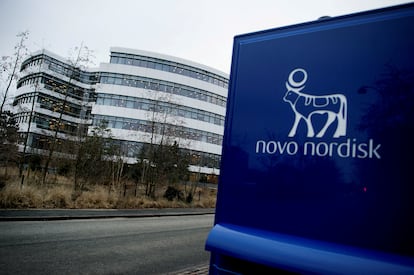Two anti-obesity drugs delay the recession in Denmark
Without the exporting boom of Novo Nordisk, now the highest valued company in Europe, the Scandinavian country’s economy would be in the red

Two anti-obesity drugs, Ozempic and Wegovy, have conjured the ghost of a recession in Denmark. The first is typically used for diabetes treatment, but its use against obesity has grown exponentially in recent months. The second is specifically targeted for weight loss. In the second quarter of the year, the Danish economy grew 0.3% compared to the three prior months, and its GDP expanded 1.7% in the first half of 2023. Without the sale of these drugs, the Danish economy, one of the most prosperous in the European Union, would have contracted 0.3% between January and June, in what would have been the first recession since the pandemic.
The owner of both prescription drugs is Novo Nordisk. The pharmaceutical giant is the largest company in Denmark, with a market capitalization worth more than the entire country’s annual output. And its recent share boom —partly due to Ozempic and Wegovy— has turned it into the highest valued company on the continent, surpassing the French luxury colossus LVMH. The Danish firm is now valued at more than €400 billion in the stock market.
“If it wasn’t for Novo Nordisk there wouldn’t have been any growth,” Las Olsen, head economist at Danske Bank, told AFP. “”We’ve never seen anything like it, it’s changing the picture of the economy,” added Jonas Petersen, an analyst from Danmarks Statistik. In the first half of the year, the pharmaceutical industry —which is responsible for approximately 4% of Danish GDP— added almost two percentage points of growth to the Scandinavian country’s growth, according to Joseph Politano at Apricitas Economics.
Between January and June, Novo Nordisk’s net profits increased 43% compared to the same period in 2022. Sales grew 29%, and sale of its anti-obesity drug alone increased by 157%. Demand for the drugs is such that, despite its efforts to expand capacity, Novo Nordisks’ facilities cannot meet it. The company is considering opening a new fabric on Danish soil. In June, it announced that it would allocate more than €2 billion to increase production.
“The boom’s timing was also almost perfect, helping to cushion Denmark’s economy against both the international shipping downturn that affected their massive international trade-related industries (especially the shipping colossus Maersk) and the energy crisis that hit Europe in the wake of Russia’s invasion of Ukraine,” Politano writes. The industrial production of the Danish pharmaceutical industry —which goes, almost exclusively, to exportation— has increased 166% in the last five years, compared to an increase of approximately 35% in general manufacturing. “Medicine production is responsible for essentially all of the growth in Danish manufacturing output over the last five years,” he adds.

The increase in sales of Ozempic and Wegovy —boosted by the prevalence of obesity, which has become one of the most common pathologies in the developed world, particularly in the United States— also has an impact on monetary policy. The export boom has increased the flow of dollars into Denmark, helping the central bank to maintain —and even increase— the value of the national currency, the krone, against the euro, without raising interest rates at the same accelerated pace as the European Central Bank. It is a breath of fresh air for consumers amidst the slowing of domestic demand, despite the fact that post-Covid recovery in Denmark has been faster than in other European countries.
The improvement in the Danish economy thanks to the export of these two drugs, particularly Wegovy, has led the authorities to double Denmark’s growth forecast for 2023: from 0.6% in May to 1.2% now. “The pharmaceutical industry, led by Novo Nordisk, has maintained a high level of production in the first half of 2023, marking a new high in June,” the Deputy Prime Minister Jakob Ellemann-Jensen recognized in late August. Employment will also grow at a higher rate.
However, the minister admitted, “many of our neighboring countries are stagnant or shrinking, and the Danish economy isn’t preventing a period of less growth.” Some sectors of the economy, he added, “have begun to cool down and we observe a fall in industry if the pharmaceutical sector is excluded.” For 2024, Danish authorities project growth of 1.4%, the same as 2023.
Denmark is not the only country in the EU that has significantly improved its growth numbers thanks to a single product. In France, GDP surpassed all expectations in the second quarter, growing 0.5% —compared to the predicted 0.1%— largely thanks to the delivery of a cruise ship.
Sign up for our weekly newsletter to get more English-language news coverage from EL PAÍS USA Edition
Tu suscripción se está usando en otro dispositivo
¿Quieres añadir otro usuario a tu suscripción?
Si continúas leyendo en este dispositivo, no se podrá leer en el otro.
FlechaTu suscripción se está usando en otro dispositivo y solo puedes acceder a EL PAÍS desde un dispositivo a la vez.
Si quieres compartir tu cuenta, cambia tu suscripción a la modalidad Premium, así podrás añadir otro usuario. Cada uno accederá con su propia cuenta de email, lo que os permitirá personalizar vuestra experiencia en EL PAÍS.
¿Tienes una suscripción de empresa? Accede aquí para contratar más cuentas.
En el caso de no saber quién está usando tu cuenta, te recomendamos cambiar tu contraseña aquí.
Si decides continuar compartiendo tu cuenta, este mensaje se mostrará en tu dispositivo y en el de la otra persona que está usando tu cuenta de forma indefinida, afectando a tu experiencia de lectura. Puedes consultar aquí los términos y condiciones de la suscripción digital.









































